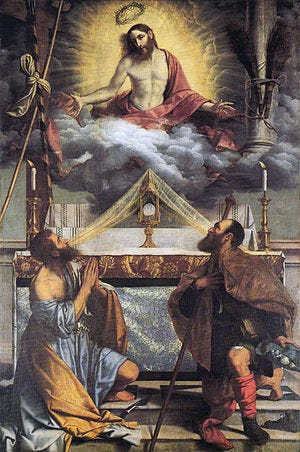Food for the Pilgrimage
Nineteenth Sunday in Ordinary Time
God understands our needs and is attentive to fulfilling them. However, what we believe we need isn’t always aligned with what God knows we require. In the First Reading, the prophet Elijah didn’t experience a crisis of faith, but rather a crisis of expectation following his victory over the false prophets of Baal. He anticipated that the triumph God granted him over the pagan priests and their false god would lead to the repentance of the people of the Northern Kingdom of Israel and their king. When this national repentance didn’t occur, Elijah felt as though he had failed both God and his people. In response, God provided Elijah with supernatural nourishment for his journey, leading him to a spiritual renewal through a personal revelation at Yahweh’s “holy mountain.”
The psalmist shares his experience of God’s mercy during a time of distress, testifying to God’s faithfulness, deliverance, and protection. He invites all who read his words to “taste” God’s goodness by seeking His mercy, finding refuge in the Lord, and participating in the sacred Toda meal, a sacrifice of thanksgiving that restored peace and fellowship with God. God is ever faithful. “Thanksgiving characterizes the prayer of the Church which, in celebrating the Eucharist, reveals and becomes more fully what she is. Indeed, in the work of salvation, Christ sets creation free from sin and death to consecrate it anew and make it return to the Father, for his glory. The thanksgiving of the members of the Body participates in that of their Head” (CCC 2673). Our giving thanks to Him constantly is a way we can live in the happiness for His everlasting faithfulness to us.
In our Second Reading, St. Paul reminds the Ephesians that the Holy Spirit has “sealed” us for the day of redemption through the Sacrament of Baptism. Baptism is an essential act of faith, marking our death to sin and resurrection to new life in Christ (see Mt 16:16; Eph 1:13 and 2 Cor 1:22). However, Christians can “grieve the Holy Spirit” when they fail to live in the image of Christ and instead revert to old, sinful behaviors. When we receive the Eucharist, we surrender our lives to God, and He provides us with “food for the journey,” the true viaticum to sustain us until we reach His “holy mountain” in Heaven.
In the Gospel reading, Jesus uses the symbolism of bread, a staple in the lives of His contemporaries, to reveal that His glorified, resurrected flesh and blood are the “food” that nourishes and sustains us on our life journey (Jn 6:54). He declares, “I AM the bread of life” (Jn 6:35). This is a bold statement that no one before or after Christ ever dare claim. And yet, if this seems too lofty a statement, it is nothing compared to the loftiness of God’s love for His children and His desire to provide for them.
Jesus assures us that those who possess His glorified life will not suffer eternal separation from God. We can trust His promise: “I am the living bread that came down from Heaven … whoever eats this bread will live forever” (Jn 6:51). The “living bread” is Christ’s gift to us in the New Covenant sacrament of the Eucharist, which replaces the Old Covenant meal of Toda (Lev 6:15, 19b-20; Lk 22:20). The Toda meal, which reestablished peace with God, foreshadowed the supernatural gift of Christ in the Eucharist, a meal of thanksgiving. A Eucharistic life is one that revolves around thanksgiving to God constantly. “As in the prayer of petition, every event and need can become an offering of thanksgiving. The letters of St. Paul often begin and end with thanksgiving, and the Lord Jesus is always present in it: "Give thanks in all circumstances; for this is the will of God in Christ Jesus for you"; "Continue steadfastly in prayer, being watchful in it with thanksgiving” (CCC 2638).
When we approach the altar in a state of grace to receive Christ in the Eucharist, we offer Him our lives in covenant bond. He touches us, as the angel of God touched Elijah in the First Reading, and invites us to “taste and see the goodness of the Lord” (Psalm response) by partaking in His glorified flesh, given for the life of the world (Mt 26:26). This is the heart of the kind of friendship we have with Christ. The more intimate we are with him, the more we reflect His goodness. Separating from Him literally rends our hearts. ““In every friendship hearts grow and entwine themselves together, so that the two hearts seem to make only one heart with only a common thought. That is why separation is so painful; it is not so much two hearts separating, but one being torn asunder” (Fulton Sheen).
The Eucharist is a gift that comes with a command: to “go forth” from the Mass, continuing the journey we began in Baptism, to love and serve the Lord. Like Elijah, we must persevere in our mission until our earthly journey concludes, and we receive our private revelation of God in His heavenly Kingdom.
Deus Benedicat



